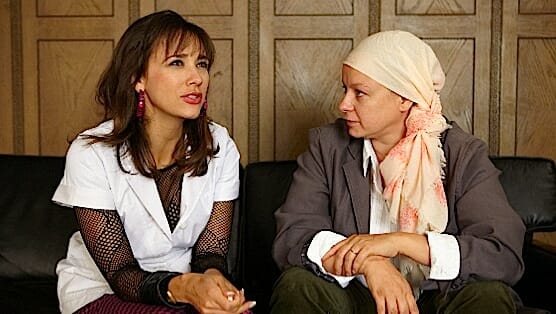
Decoding Annie Parker boasts a deep roster of recognizable faces. This speaks to the enormous potential of its material, which is rooted in the true story of a three-time cancer survivor and the scientific discovery of the hereditary breast cancer gene. In the hands of a first-time feature director with no overarching idea of how to wrangle disparate narrative strands into the shape of anything consequential, however, this well-meaning but hopelessly disjointed period drama comes to resemble nothing so much as a Lifetime movie run amok and off the tracks, unfolding in maddening fits and starts under a series of problematic wigs and skullcaps.
Samantha Morton stars as the title character, a Toronto high school graduate who in the early 1970s marries her pool-cleaning, would-be-singer-songwriter boyfriend, Paul (Aaron Paul), and in short order becomes pregnant. After having lost first her mother and then her older sister, Joan (Marley Shelton), to breast cancer, Annie is devastated when she too is diagnosed with the disease. While the medical establishment scoffs at any sort of inherited connection, and her husband struggles with how to relate to her, Annie goes to school on cancer and finds sympathetic embrace from a progressive-minded doctor (Corey Stoll) and former oncology nurse (Rashida Jones). Meanwhile, thousands of miles away, university professor and research geneticist Mary-Claire King (Helen Hunt) works with her team, trying to prove a hereditary link in breast cancer.
Decoding Annie Parker isn’t honestly interested in science, though that’s certainly no great crime. The oversimplification of King’s research and almost haphazard way in which it is interwoven into the narrative, however, as a mock-intellectual adjunct to Parker’s story, makes it feel like some odd obligation, a paid-off bet. Truth be told, there’s little reason for King’s story to be paired with Parker’s here, other than the fact that they topically overlap and both cover more than a decade. The characters meet once, briefly. In stretching to wanly accommodate various markers of biopic cinema, though—Annie’s betrayal by a friend (Alice Eve), and her relationship with a second husband (Bradley Whitford)—the movie shortchanges any legitimate chance at establishing a parallel dramatic pillar.
To that end, Hunt has little to do, save float above the picture in a glorified cameo, with alternately puffed-up and impatient expressions. Paul, meanwhile, is first stuck under a Halloween-style Jared Leto wig, and then saddled with a Billie Joe Armstrong look that seems wrong for the era. Morton is an anchoring presence, and undeniably the film’s strongest selling point; she throws herself into the role and wrings a couple moving moments out of the material here and there, particularly in relation to Annie’s desexualization after her second bout of chemotherapy. But it’s not enough, and the actors are by and large all undone by Steven Bernstein’s unsettled, kitchen-sink directorial approach.
As a cinematographer, Bernstein has a long and unusual list of credits, ranging from Like Water for Chocolate and Monster to The Waterboy and White Chicks. One of the more surprising things, then, is that Decoding Annie Parker doesn’t evince a more developed and evocative visual scheme, or even much attention to detail and consistency. Its presentation is flat and stagey. Sometimes title overlays merely indicate a year, other times a specific day or even time (“Seven hours after surgery”). In short, the film is a mess. It’s when the director literalizes King’s investigation with a “Genetic Marker” road sign, however, that viewers may most want to drive their heads through drywall.
Powered by whiplash tonalities, the movie’s unwieldy, stacked-deck narrative cycles through a series of tableaux that are largely familiar, frequently phony (a food fight that leads to the teary revelation of a breast lump) and sometimes, remarkably, even both at the same time. The dialogue flirts fairly constantly with inanity (“Look, Anne: white coat, stethoscope—you can trust me,” says one doctor dismissively), and rather than genuinely invest and dig into the relationship drift which results from Paul and Annie’s diminished sex life, as the film first hints it might, Bernstein and his co-writers lurch from scene to scene, grasping for cheap emotional payoffs.
There are a few interesting bits scattered throughout, but Decoding Annie Parker is fundamentally flawed in its mashed-up structure, and just poorly rendered to boot. The only thing to decode from this cinematic train wreck is whether anyone involved bothered to actually read the script and meet with the director beforehand, or merely signed onto the project based on charitable impulse.
Brent Simon is a regular contributor to Screen Daily, Paste, Playboy, Magill’s Cinema Annual and ShockYa, among many other outlets, as well as a member and former three-term president of the Los Angeles Film Critics Association. You can follow him on Twitter and on his blog.
Director: Steven Bernstein
Writers: Adam Bernstein, Steven Bernstein, Michael Moss
Starring: Samantha Morton, Aaron Paul, Rashida Jones, Corey Stoll, Alice Eve, Helen Hunt, Richard Schiff, Bradley Whitford, Bob Gunton, Marley Shelton, Benjamin McKenzie, Maggie Grace, Mageina Tovah, Kate Micucci, Chad Lindberg
Release Date: May 2, 2014